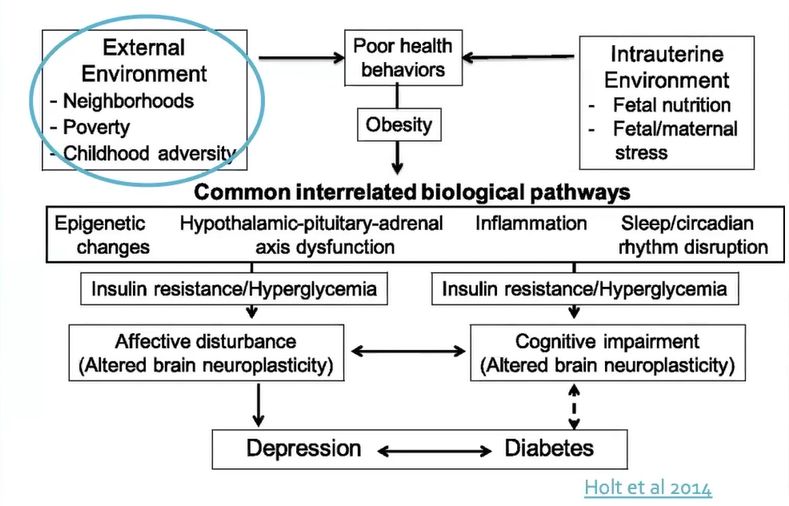Recording: Mental Health and Trauma: Context and Consequences
An extremely important aspect of health is mental health. In this lecture, multiple speakers talked about how mental health can worsen through a variety of sources and those can have drastic consequences on overall health.
Diabetes
Diabetes is a manifestation of trauma
I found this method of looking at diabetes eye-opening. We tend to look at diseases in a vacuum; there is specific cause for a disease. We rarely consider a build up of different problems to lead to disease. Emily Mendenhall talked a lot about of diabetes as a "build up of trauma". Diabetes is not just a single bad health condition, but can stem from a build up of many small issues. She mentions "pathways" that diabetes can stem from. Forced relocation, fragmented social networks, and other events that negatively impact mental state. One story in the lecture is of a Mexican woman who immigrated from Mexico to Chicago. When in public she is constantly afraid of other people. This constant fear and anxiety takes a toll on one's mental state. Over many years, this can greatly decrease health. Diabetes as a way to look at trauma is not just about one experience that created the onset for the disease, but instead multiple traumas.

35:13 in the video. Shows different factors and determinants for diabetes
Because this is a build up of trauma, different groups are affected adversely. Specifically for diabetes, I did research on Native American communities. There is a generational trauma that comes into play with Native Americans. They have had a history of forced relocation and constant neglect from the government. They are lacking infrastructure for health and many other daily needs. Compared to more dominant races, they have more health problems throughout their lives. They have a build up of trauma that is embodied in them through diabetes.
In class, we had a guest lecturer talk about trauma informed care. If we view disease as a manifestation of trauma, trauma informed care is the method in which we should approach treatment. The paper we read talked about how ACE's affect trauma and are a leading factor for many diseases and health problems. In the case of trauma and diabetes, ACE's are a form of trauma. If we aren't conscientious about past traumas, we can accidentally make the situation worse or resurface past traumas.
Policing
Living condition can greatly affect stress from day to day. The same things may not cause stress for everyone. One that is more prevalent today-and John Pamplin discusses this-is fear around police. There have been numerous statistics showing how Black people and other non-white races are much more likely to be stopped by police officers or frisked. Even if they did nothing wrong, there is still a fear that the police will stop them. If acting nervous around police officers, that may even be a reason to be stopped. This constant over-policing can greatly affect people's mental health. Over time, these can cause lasting health problems, potentially even "deaths of despair". (I talk more about this in the page Politics Effect on Health in America)
Pamplin talks about the desire for more policing. He states that it's only people who aren't over-policed that want more policing. Other interventions are significantly more affective in reducing crime than increased policing. When there is viewed a lot of crime, the initial response is to increase response rather than prevention. Police are tasked with responding to crime, not necessarily preventing it. The issue with over-policing is not that it is fundamentally flawed, it is that it adversely affects racial minorities and isn't the best way to decrease crime.
Police are also made up of dominantly White males-members of the dominant caste. Wilkerson, in the book Caste, talks about how the dominant caste constantly reaffirms their positions through belittling the lesser castes. We can see this all throughout policing. The constant stops, frisks, and suspicion are all methods to keep the caste system the same. It is the dominant caste that wants more policing, and not to accept that education and community approaches are a way that mutually helps everyone.
Another resource I came across was a video from Kevin Lieber (Vsauce2). In this video, he explained the shift of policing towards statistics and quotas. These quotas adversely affect racial minorities since they become easy targets and when there is an incentive to find more crime, police can manufacture situations. He's not saying that this always happens, but there have been documented cases when severity of crime was changed to fit into a specific category that not enough crime was found. This fits into the caste model and shows how dangerous for minorities increasing police presence can be.